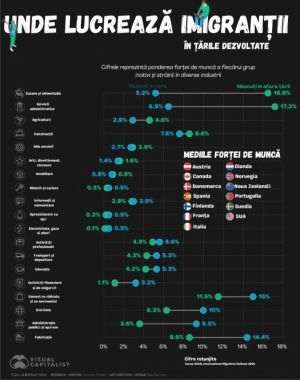The exit from the insolvency of the Romanian state is done on the back of the business environment by means of law 296/2023 through which new fiscal measures were introduced, the participants of the conference "Austerity measures vs. the business environment" organized by the Chamber of Commerce argued yesterday of Commerce and Industry of Romania (CCIR) in partnership with the law and consultancy firm Piperea&Asociatiţii. We mention that the last two ministers of public finance - Adrian Câciu and Marcel Boloş - were invited to attend that conference, but both "shine" through their absence due to the government meeting they had to attend, which is why many of the questions representatives of the business environment in our country remained unanswered.
In the opening of the event, Mihai Daraban, the president of CCIR, showed that private companies support the state budget and that it is incorrect that the new fiscal measures are directed against entrepreneurs.
Mihai Daraban stated: "CCIR was among the institutions that did not understand why the business environment should be punished in this situation and I say these things because in the last period and especially in the last year the business environment did its duty brilliantly for the national budget. We have fresh in our memory the latest data from the Tax Office, from August 2023, figures that are more than gratifying, in the sense that we had over 864,000 companies that submitted their balance sheet to the Tax Office, and the turnover increased from 392 billion euros to 429 billion euros. Gross profit increased from 41.5% to 54.6% in one year. The business environment has done its duty towards the state budget, but any positive scores we get cannot satisfy the consumption appetite of the Romanian state, the appetite to spend public money. That is why I did not understand these new tax measures. I said that the state must set an example of good practices, to tidy up its garden, regarding the state companies that are holes in the state budget, because they stepped on the light bulb. In Romania we have 1042 commercial companies with an individual turnover of over 50 million euros, but of these only 11% do not make a profit, and among the unprofitable ones are CFR Marfă, CFR Călători, Compania Nationala de Aeroporturi Bucharest and others that remain the same with debts that roll over from one year to the next. We conveyed to political decision-makers that they have several fronts of action before they jump at the business environment's throat. For example, at the Ministry of Justice there are 1.2 million companies, which appear at ONRC as active and in operation, but 360,000 companies do not submit the balance sheet".
The President of the CCIR stated that the Government should have taken other measures, including the administrative reorganization of the country, which was proposed by the business environment.
Mr. Daraban stated: "Last year there was an overestimation of the budget revenues for 2023, and the expenses remained at the same level. I think the revenue overstatement came from the estimate of rising energy prices, but the reality on the ground has shown that prices have fallen. I think it is a structural problem of the state: in its current form it can no longer function. The current administrative construction will invariably lead to bankruptcy, because mayors with localities of 500-600 inhabitants claim to have a school and a gym, although they have no children in the locality. There are cities of 1,900 inhabitants where the urban salary scale applies for town halls, far too many county councils, county councilors with allowances higher than the salaries of some teachers. There are too many anomalies and leakages from the budget, as well as too many agencies. For example, at ARICE (ed. - Romanian Agency for Investments and Foreign Trade), we already have two people on each car, they do not have an operating budget, only a salary budget. All these sinecures will invariably lead to a default which we have also seen in larger countries, Argentina, etc. It's a pity that the business environment does its duty with such abundance towards the state budget".
The CCIR representative believes that the 1% tax applied to companies with a turnover of more than 50 million euros will encourage some entrepreneurs to seek solutions within the limits of the law to avoid it.
Mihai Daraban said: "The blow for those with a turnover of over 50 million euros, companies that matter, leaves much to be desired and we will see in the short term that there will be effects on the business environment. Some will break up the companies to reduce the taxed turnover by 1%, others will relocate their companies, because the state easily pushes you to all kinds of mini-scoundrels so that you can survive in this environment in Romania".
• Gheorghe Piperea: "If the business environment is squeezed out of income annually, we will talk about it's a generalized bankruptcy"
For his part, prof. univ. dr. Gheorghe Piperea warned that most of the provisions of law 296/2023 enter into force today, the rest will enter into force from January 1, 2024, and some from the second semester of next year, and drew attention to several aspects that will have a huge impact on the business environment.
Gheorghe Piperea said: "There is a chapter IV in the law, in which there are several shocking provisions. For example, the ban on the conduct of business that takes place without complying with the legal provisions or during the period in which they are suspended. Does this prohibition refer only to the time before the establishment of the enterprise or after the establishment of the enterprise? There are 1.2 million companies registered with ONRC, but only 846,000 submit their financial statements annually. It means that the rest of the companies, which do not submit the balance sheet, do not meet the legal conditions. What if another company becomes a business partner in a relationship with such an enterprise? To what extent is the legally operating company affected? Then we have the prohibition of carrying out commercial activities with goods that are not accompanied by the documents of origin. But what do we do with the online environment, with platforms like Olx, where everything is sold, without provenance documents. The law also says that sanctions can be applied. Regarding the sanctions, in case of exceeding the daily collection ceiling of 50,000 lei, it is not clear to me whether the measure of confiscation provided by law refers to the amount found in the house above this ceiling or to the entire amount of money in the house. I also looked at CASS, where there are different ceilings, which lead to very high costs for employees who also practice an independent profession. But the most shocking of the provisions says that if you are part of the 15 million citizens who have money on them and the tax body found you and the money has no identified source of provenance, a 70% tax is applied to that amount. We have in the Constitution art. 44 para. 8 which says that licit wealth is presumed and that only ill-gotten wealth can be seized by the court. The idea of even retroactively taxing amounts that cannot be identified already existed in the Fiscal Code. The new law says that this 70% tax is applied to combat tax evasion, money laundering and corruption. No measure put into practice in 25 years has led to a decrease in tax evasion or a decrease in tax optimization. Is money being laundered through cash transactions? They are visible, they are perceptible, unlike digital transactions through the bank. The phenomenon unnoticed by anyone, but which has increased, is that of phishing, of stealing bank data".
His Majesty also spoke about the VAT increases introduced by law 296/2023: "I would have expected the austerity law to introduce measures to increase VAT receipts. In reality, differentiated VAT rates have been introduced in unexpected areas, given the fact that the real estate market is declining. Unexpectedly, the VAT for festivals and traditional products rose from 5% to 9%. This measure seems like a penalty, a kind of excise to restrict the consumption of products of this kind. I draw attention to the fact that when the VAT changed from 19% to 22%, it was immediately seen in the economy in 2010, when there were the most bankruptcies in the economy".
Mr. Piperea, the lawyer, stated that he analyzes the law 296/2023 as a state reorganization plan to avoid becoming insolvent.
Gheorghe Piperea stated: "I look at what the Legislative Council said and I notice that the first point in the Opinion of this council shows that through the new law the task of exiting the insolvency of the Romanian state is placed on the back of the business environment. It is estimated that in 2024 there will be revenues to the state budget from the private sector of 100 billion lei more, while the state reduces expenses by only 16 billion lei. If you annually squeeze the business environment out of these revenues, it will become weak at some point and we will talk about a generalized bankruptcy that no one wants".
Mr. Piperea also referred to the limitation of cash payments introduced by the new law and stated that this limitation will lead to the reappearance of barter in the countryside.
Gheorghe Piperea said: "Regarding the limitation of cash payments, not only the village supplies, nor the rural grocers will have problems, it is rather about citizens, who either do not have a bank account, or do not have the possibility to make digital or smartphone payments , there are even citizens without electricity. Talking about banks and digitization is a bad joke. The problems are also at the supermarkets in Bucharest, Cluj or Timişoara. The European Central Bank has said that physical cash payments must not be abandoned, as abandoning cash payments will lead to social exclusion. According to the limitation of cash payments imposed by the new law, purely simply 50% of the country's population will no longer be able to participate in the life of the city and will not be able to enter commerce because they do not have access to digital payment. There is a CJEU decision from January 2021 which says that European citizens have the right to pay in cash and companies have the obligation and the right to collect these payments. I'm sure solutions will be found. For example, the people of the country will turn to barter again. I remind you that in the 90s bilateral or trilateral compensations were applied with the consent of the state".
• George Georgescu: "The year 2024 will be a problematic year from a fiscal-budgetary point of view"
George Georgescu, a member of the Fiscal Council, mentioned that the problems faced by the government regarding the collection of budget revenues could be exacerbated next year due to the increase of some expenses.
Mr. Georgescu said: "We, the members of the Fiscal Council, believe that the ESA budget deficit will reach over 6% in 2023. If in 2023 we do not fall within the deficit target, the year 2024 presents itself as problematic, because pressures on the pension fund area and the increase in defense spending will increase. The year 2024 will be a problematic year from a fiscal-budgetary point of view"
The representative of the Fiscal Council showed that that institution insisted on achieving a fiscal consolidation by substantiation based on studies and figures and by reducing budget expenses.
George Georgescu stated: "The manner in which these measures were adopted is very far, it is at the opposite pole of what should have been done. In 2024, we will start those spending-reviews, and the Ministry of Finance should have come from June with them, through the technical assistance of the World Bank, in the field of health and later in the field of education, but it has not come with them until now, although their review takes a year. (...) The new fiscal measures are emergency measures that only take you out of the difficult zone in which you are at the moment. The current measures are to save what we can for the months of November-December 2023, but in no case will they lead us to a deficit of 4.4%".
He also drew attention to the pressures exerted on the business environment by the crises of recent years, pressures over which the impact of the new tax measures also settled.
Mr. Georgescu declared: "In recent years, the business environment in Romania has been subjected to extraordinary pressures. After the pandemic, the conflict in Ukraine intervened, with an impact on the explosion of energy prices, which were transferred to all other prices. Disruption of high value-added or supply chains due to the pandemic has had a negative effect, such as in the case of semiconductors. Added to all these tensions and pressures were existing ones, such as labor shortages that had intensified. Recently there has been fiscal pressure for the business environment that wants legislative and fiscal stability. The pressure goes against the course of a business recovery in Romania in the context of these crises, the combination of which has an effect that is very difficult to control, and it exists and manifests itself. We thus observe a fantastic pressure on the business environment in Romania. The importance of this macroeconomic framework shows that any degradation by Romania's rating agencies implies the decay of countries not recommended for investment into the junk zone".
• Dan Paul: "The 2% tax can generate a systemic risk in banking"
The president of the Association of Brokers in Romania, Dan Paul, stated that the 2% tax on bank turnover can generate a systemic risk in the banking sector.
Dan Paul said: "The law introduced an additional 2% tax on the banking system. But if the bank has little or no profit, there is systemic risk regarding the implementation of this tax. Has anyone calculated what the 2% or 1% impact is? I think that many times the wrong motivations were sought for the introduction of these fiscal measures".
The president of the Association of Brokers showed that government representatives have repeatedly stated that the main motivation of law 296/2023 is the fact that the budget deficit exceeded 6% of the Gross Domestic Product.
Dan Paul also said: "The law also talks about reducing state expenses. But the Romanian state is a shareholder in various companies that are listed on the BSE. This year, Nuclearelectrica put up for auction a 17 million euro coaching and mentoring contract to which two companies signed up, one of which is from Romania. I thought that Nuclearelectrica managers are good at mentoring. I think it's a joke and hypocrisy to discuss state austerity under these conditions. Such contracts that run for four years for 17 million euros are examples that show us how the state's money is spent".
His lordship mentioned that the dividend tax increase will affect the entire capital market in our country and recalled that the state wanted to to reshape contributions to Pillar II of pensions, but the measure did not pass Parliament.
Dan Paul pointed out: "I think that Pillar II of pensions should not be abolished, because it accumulated a lot of money, and part of it financed the state by buying government bonds, and another part financed the investments of companies listed on the BVB . The state should first think about what to do with its public pension system, which is an outdated system. The state noticed that Hidroelectrica's listing was also supported by Pillar II of pensions, which is a suitable example and can be helped more through privatizations, such as the privatization of Salrom, Otopeni airport and Constanţa airport".
• Tax consultants, without solutions in the face of tax changes
The tax consultants present at the event did not offer solutions regarding the new tax measures, but criticized the legislative unpredictability in the tax field.
Manuela Furdui, managing partner of the Crowe Romania company, said: "Companies are scared by the new tax changes and disturbed by the lack of predictability. Why does the private sector always have to pay for a budget that was wrongly drawn up when we increase VAT rates and taxes, although we are only able to collect 37% of VAT? How do these fiscal measures stimulate investments in Romania? What happens to a company that invests and cannot recover its investment because as soon as it exceeds 50 million turnover it has to pay minimum tax? The private sector is the main source of funding for the state budget".
For her part, Mihaela Mitroi, managing partner at the Global Tax Advice company, said: "In recent months, we have drawn attention to the fact that we must take care of Romanian entrepreneurship, if we want to have a society that develops harmoniously. Through this law, entrepreneurship is attacked. We notice that the micro-company regime changes overnight extremely often. Last year we had GEO 16/2022, which changed the micro-companies regime. Now it has changed again. Are we talking about predictability? I, in the 20 years since I contributed to the Fiscal Code, believe that this word has been used so often that it has become either outdated or relative. We cannot change the tax regime every year because it affects us. We say we are bound by the EU. It is true that there are pressures and we have to stay within the parameters because we have to play a European game, which I agree with, but that does not mean that we as a state do not pursue our interests. The EU encourages the differentiated tax regime for SMEs and entrepreneurship".
Asked by the entrepreneurs present at the event what solutions they can recommend to them in the face of the new tax measures, the specialists offered them only one, which means money spent and a long time: appeal in the administrative and fiscal litigation courts, courts that grant deadlines more and more longer for the resolution of cases brought to trial.
The only viable solution at this moment seems to be the one advocated by the lawyer Gheorghe Piperea, namely, the attempt to amend law 296/2023 through the adoption by the Parliament of new legislative projects that include in them all the amendments that the government refused to take into account account.


.jpg?31191337)
.jpg?31191337)






















































